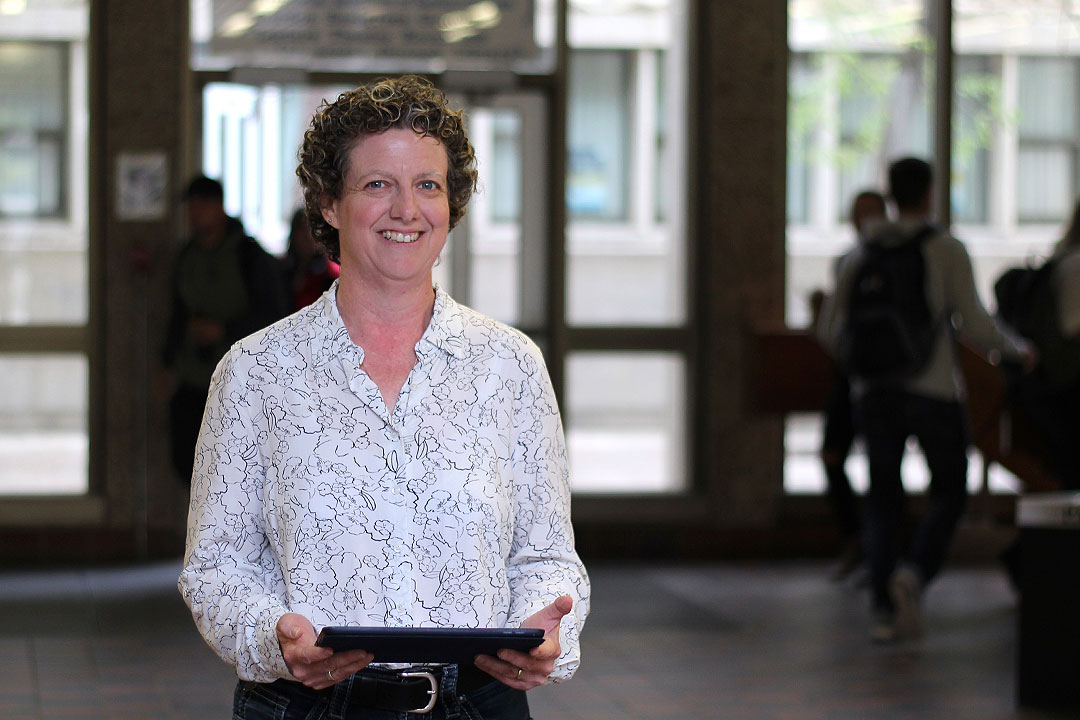
Open textbooks lead to community contributions
Had any cool geological experiences lately? Sessional lecturer Karla Panchuk hopes some of her students have, since she will soon be asking them to contribute to the class textbook by sharing photos and stories.
By Meghan Sired“I would really like one of my students to write about seeing a volcano for the first time: what the smells were, any vibrations they felt, how hard it was to get to the crater,” said Panchuk, who specializes in geology and geochemistry. “I think stories make ideas stick far better than a list of facts.”
Panchuk has learned that contributing to a textbook is a fairly seamless process if the book is classified as an open textbook, meaning it has an open copyright license and is available online to be freely read by anyone. Since 2015 she has used an open textbook to teach her physical geology classes, and for the past six months she has worked on a large-scale revision and adaptation of the text, with the help of Joyce McBeth and Tim Prokopiuk in the Department of Geological Sciences.
Panchuk uploads a new version of the book once a chapter is completed.
“What I really like about open textbooks is that I have control of what’s in there, and I don’t have to cater to a publisher’s timelines,” said Panchuk. “I can make changes when I need to and I can easily fix errors, like typos.”
If there are new discoveries or developments, Panchuk will add those in, too.
“NASA is always discovering new exoplanets and Earth-like planets, and it’s neat to be able to quickly update the textbook about the new information NASA announces,” she said.
A graduate student is working with Panchuk and Indigenous communities to add stories about local geological events that have been passed down for generations.
“Geology textbooks do not have Indigenous points of view, so we want to bring some of these Indigenous stories into the textbook, but we want to do it in a way that is respectful of their traditions,” said Panchuk. “They’re not our stories to tell, so we want to make sure that they’re the ones telling the stories.”
The act of students contributing to future learning material of a class is termed open pedagogy. According to Heather Ross, an educational developer at the U of S Gwenna Moss Centre for Teaching and Learning, research shows when students submit assignments that they know will be read by not only their instructor, the quality of their work goes up.
“Students now aren’t only consumers, they’re contributors,” said Ross. “Research also shows that students do as well or better in courses that use open textbooks, likely because students can afford to read the resources they’re assigned.”
According to Ross, 4,000 students will use open textbooks at the U of S this academic year, which will result in a total savings of $400,000, assuming that an average textbook costs $100. Since Ross started tracking the use of open textbooks in the 2014-15 school year, instructors have saved their students close to $800,000.
Ross hopes that soon classes within the university’s online class search tool will show when a class uses an open textbook or if it is a Z-course. A Z-course, or zero course, is a term that indicates there is no or minimal (under $35) material cost for the class.
Panchuk and Ross have seen first-hand how pleased students are when they learn the class textbook is free.
“I’ve had numerous students express a great emotional relief that the textbook was open,” said Panchuk. “It takes a bit of explaining sometimes. Some of them don’t understand that it’s just there online for them.”
Ross acknowledges that it takes a lot of time for an instructor to switch to an open textbook, but there is financial support available to hire a graduate student or sessional lecturer to update ancillary resources, like a class PowerPoint presentation.
There’s even an open textbook on making open textbooks.
“You only have to make it right for your course,” said Ross. “It doesn’t have to be a full textbook either, it can be a grouping of resources.”
Instructors are encouraged to visit open.usask.ca for more information, or to register for an upcoming national conference. That event, entitled Teaching and Learning Today 2018, will be held in May on the U of S campus, focusing on open textbooks and indigenization and how they can complement one another.
Meghan Sired is a communication co-ordinator with the Vice-Provost Teaching and Learning portfolio.

